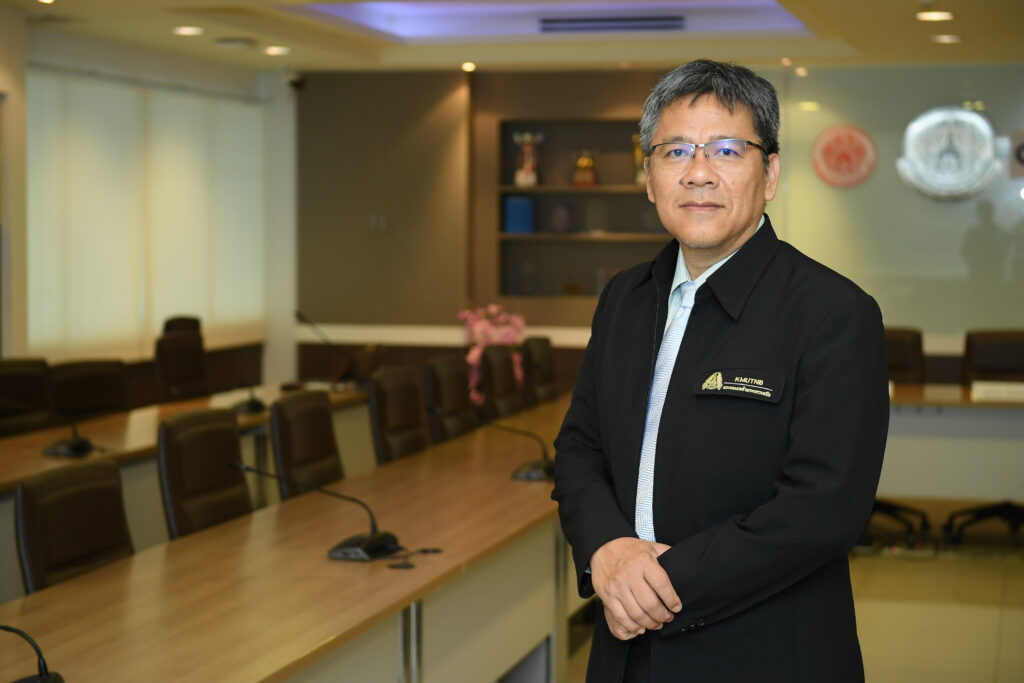CDG and KMUTNB Expedite Coding Trainer to Support Digital Labour Markets
The global trends currently under watch with possible impacts on future Thai and international labour markets are stemmed from the growing role of technologies like Internet, Artificial Intelligence (AI), Big Data, and Cloud. According to the World Economic Forum (WEF)’s report, it is expected that by 2022, on average, 58% of labour hours will be carried out by humans and 42% by machines and algorithms. These figures indicate that employers are expecting to expand their workforce by employing workers who will have new, specific skills to deal with creating innovations and applying technologies. The coding skill is among the top 10 skills mostly needed at national and global levels.
IT and digital skills play a crucial part in applying technologies to work systems to enhance business efficiency. Thus, there is a growing need for more IT personnel as professionals in this field are extremely scarce in labour markets. In the U.S., the employment in IT-related fields was projected to grow by 13% from 2016-2026, higher than an average of all professional fields. People in the fields of cloud computing, big data, and information security would be highly needed. An IT labor shortage of over 2 million positions is expected to happen by 2023. Organizational transformation is currently being undertaken by many organizations. People’s skills need to be developed to embrace for changes. According to the overall findings in WEF’s Future of Jobs Report 2018, around 49% of internship happened in-house and it offered an opportune time for the students to learn from real-life experience and experts in particular fields to gain more skills before entering labour markets in the future.

The said trends clearly signal the importance of the future professional skills which are in the highest demand in the labour market. CDG Group, Thailand’s leading technology solution provider, the founder of the “CDG Code Their Dreams” project, and the Department of Computer Education, Faculty of Technical Education, King Mongkut’s University of Technology North Bangkok, signed an MOU on academic collaboration to conduct the “CDG Code Their Dreams: Public Training” project to offer the program on computer programming and application of computer software and electronic tools. The students, teachers, and the general public attending the program will have a chance to learn coding techniques and other computer software skills. The program focuses on computer language learning development and digital preparedness for further studies and teaching and equips the learners with the knowledge that can be applied to their real work and accommodate future market needs.
Mr. Thitipong Thamvisoot, a graduate student, one of the instructors under the “CDG Code Their Dreams: Public Training” project, shared his view as a coding trainer that people in this era are born at the time of industrial revolution where technologies are becoming a key part of their livelihoods. Capacity and knowledge enhancement and thinking process play a crucial role in technology-based work design and control. In other words, “people in today’s era have to know how to use technology to enhance their work performance.” The faster the machine has developed, the quicker the people have to adjust themselves. The most important part of the adjustment is to change a perspective about automation. Instead of viewing machine as a threat that can replace human, people should view automation as a tool or an enabler to enhance human’s work and capacity. The learning of coding under the “CDG Code Their Dreams: Public Training” project helps under how to think systematically and solve problems efficiently. Workshops on writing computer commands, writing codes correctly, and creating products with different computer software such as Scratch or Thunkable are effective practice exercises for learners.

Mr. Chakpat Chomphan, a graduate student, shared his view as another project trainer that the project provided new experiences and coaching techniques for further improvement as well as new methods to impart knowledge to learners for capacity building. The project helped learn how to solve problems at hands with unprecedented or different approaches. Training people to be knowledgeable in coding and to gain further knowledge in the field was a proud achievement. The learners clearly exhibited logical and systematic thinking skills that can be applied to private and professional lives. Almost 100% of the learners were interested to learn other courses in the future to further develop coding capacity and gain more expertise. It could be said that the trainer and the project were successful in producing Thai youth to keep up with global labour markets.
Asst.Prof. Dr. Krich Sintanakul, Head of the Department of Computer Education, Faculty of Technical Education, stated that the project’s objective was to lay down basic knowledge about coding or computer programing by teaching coding skills to student and teachers as well as the general public. After the training, the learners should be able to share such knowledge with others and the students should be equipped with skills that can be applied at work. The past year’s courses included Scratch Software, mBot Robot Building, Thunkable Software for Application Creation, and Line Stickers. This year, new courses added are Python Programming Language, How to Create Motion Graphic, and IoT Smart Building. In 2020, the total target is 30 courses. The course highlights are the simple and systematic learning formats; and the activities that create understanding and can be followed with concrete results as well as can be further applied and shared with others. Last year, the project created a total of more than 200 trainers and coders. This year, the project is expected to welcome more than 1,000 participants.

Asst.Prof.Dr. Krich. also said that the heart of personnel development in this era is to stay current with technology and make one’s own efforts. People should attain the three aspects of competency in a particular profession: knowledge, skills, and a proper mindset about that profession. Studying coding will help spark a reason-based thinking process and an ability to take further steps creatively because, at each step of the coding, learners will learn a planning process, a thinking process, and a way to doing things step-by-step and with efficiency.
Mr. Nart Liucharoen, Chief Executive Officer of CDG Group, the founder of the “CDG Code Their Dreams” project, said that despite the increasing role of technology in today’s and future labour markets, human continues to be a key factor in moving things forward. The abilities to embrace new things and act proactively by looking for self-development as well as the collaborative efforts to develop Thai youth to be workers of the future who stay ahead of technology will be key weapons for Thai children to survive the digital era battleground. The integration of human and Artificial Intelligence (AI) will be the most efficient solution to live and succeed in the digital world.







